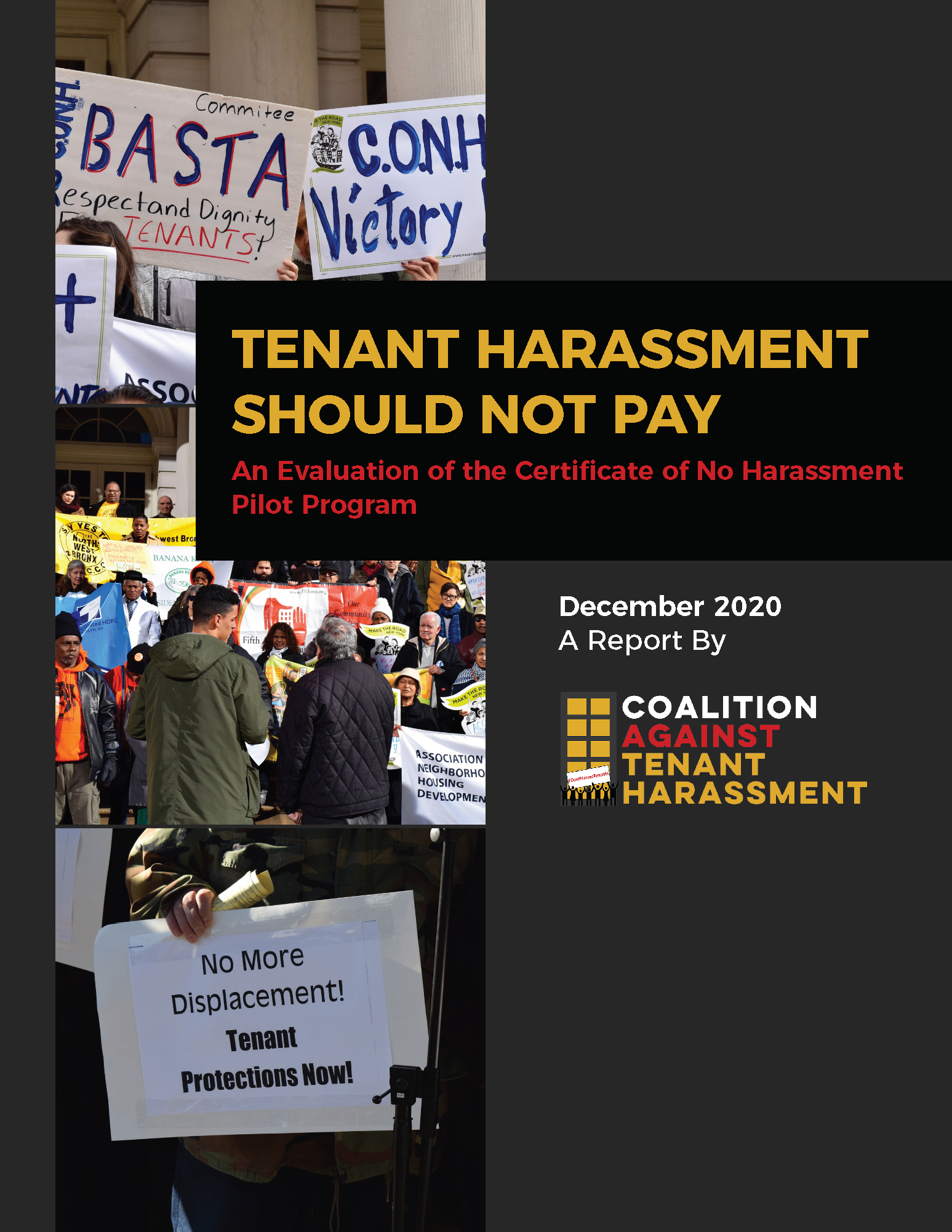Executive Summary

The Certificate of No Harassment (CONH) Pilot Program was designed to prevent tenant harassment by regulating an owner’s ability to do renovation and construction projects, which help bring in higher rents. The program uses New York City’s permitting process as a point of leverage, requiring landlords to get a certification that they have not harassed tenants before they can obtain permits to do significant renovation or construction in their buildings.
The Coalition Against Tenant Harassment (CATHnyc), a citywide coalition of community organizations and legal service providers fighting the displacement of low income tenants, worked to enact the CONH Pilot Program in 2017 to prevent harassment and ensure tenants can stay in their homes. Two years into the 3-year pilot program, CATHnyc undertook an assessment of how the pilot program has fared in achieving its goal of stopping tenant harassment.
To do so, CATHnyc conducted extensive interviews with tenant organizers, community-based outreach workers, and legal services providers; analyzed available data on eligible buildings; and held focus group-style conversations among coalition members.
Limited data and unforeseen events greatly impacted the pilot program and our evaluation of it – namely, the passage of the June 2019 Housing Stability and Tenant Protection Act (HSTPA) and the onset of the COVID-19 pandemic greatly reduced the volume of applications and shifted the legal landscape and real estate market over the course of the pilot program. Nevertheless, we found evidence that CONH is appropriately targeting buildings that have clear indications of harassment, signs of behavior change in landlords whose buildings are eligible, and examples of supporting holistic tenant organizing strategies:
- Two organizers we spoke to were able to successfully use the CONH investigation processes to engage tenants in organizing around the systemic problems they faced.
- Application withdrawals, which represent 43% of applications that had a final outcome, suggest that CONH did impact landlord behavior.
- Three of five harassment indicators were lower in buildings that the Department of Housing Preservation and Development (HPD) granted CONHs versus buildings whose owners withdrew applications: the number of executed evictions per unit, problems reported to HPD per unit, and HPD violations per unit were lower on average for buildings that received CONHs versus buildings that withdrew their permits (0.02 versus 0.03, 3.79 versus 6.57, and 6.33 versus 8.54).
At the same time, the program needs adjustments in its design and implementation to more effectively disincentivize tenant harassment:
- The eligibility criteria of the CONH Pilot Program are too narrow to meet the scale of the problem.
- The covered work framework is too narrow and does not capture landlords’ failures to make repairs; it also does not address landlords doing work without obtaining required permits.
- Data on buildings where HPD granted CONH applications shows problematic indicators of harassment, and detailed information on how HPD made those decisions is unavailable.
- Implementation of the CONH Pilot Program fails to enable the necessary organizing, communication, and transparency for full tenant participation in the CONH process.
- The lack of tangible benefits to tenants is a barrier to their full participation in the CONH process.
Based on these findings, CATHnyc recommends the following:
- Expand CONH so it protects tenants citywide and make the program permanent.
- Update the program design to better achieve goals of preventing tenant harassment and displacement; close loopholes.
- Ensure the program incentivizes and facilitates community-based organizations to organize and fully engage tenants in the CONH process.
- Enable tenants and organizers to effectively participate in the CONH investigation and overall process.
- Create opportunities for tenants to see tangible, positive outcomes as a result of their participation in the CONH process.
CATHnyc’s detailed individual recommendations can be found here. We believe that if elected officials and HPD meaningfully incorporate our recommendations into a permanent, citywide CONH program, it will be an effective tool for preventing tenant harassment in New York City.